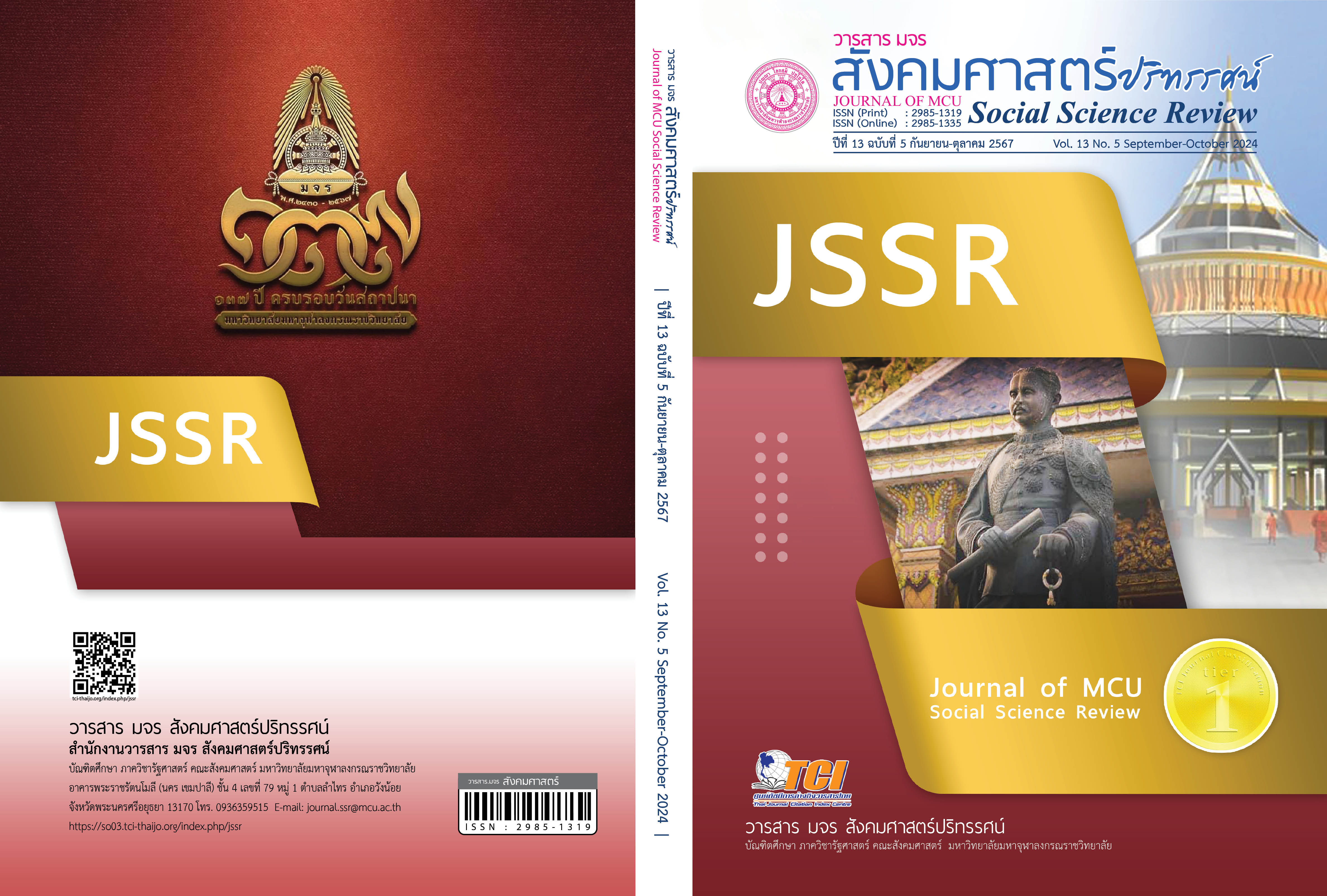ผลกระทบของความรับผิดชอบต่อสังคมที่มีต่อความภักดีตราสินค้าผ่านบทบาทองค์ความรู้ตราสินค้า และความไว้วางใจในตราสินค้า : บริษัทประกันชีวิตในประเทศไทย
คำสำคัญ:
ความรับผิดชอบต่อสังคม, องค์ความรู้ตราสินค้า, ความไว้วางใจในตราสินค้า, ความภักดีตราสินค้า, ประกันชีวิตบทคัดย่อ
บทความวิจัยนี้มีวัตถุประสงค์เพื่อศึกษาอิทธิพลทางตรงและทางอ้อมของกลุ่มตัวแปรดังต่อไปนี้ 1. ความรับผิดชอบต่อสังคม 2. องค์ความรู้ตราสินค้า 3. ความไว้วางใจในตราสินค้า ที่มีต่อความภักดีในตราสินค้า 4. ความรับผิดชอบต่อสังคมที่มีต่อความภักดีในตราสินค้า
การรวบรวมข้อมูลจากผู้ที่ซื้อประกันชีวิตในประเทศไทย จำนวน 399 ตัวอย่าง เครื่องมือที่ใช้เก็บข้อมูลได้แก่ แบบสอบถามออนไลน์ที่ผ่านค่าความเที่ยงตรงจากผู้เชี่ยวชาญ จำนวน 4 ท่าน และผ่านเกณฑ์ความเชื่อมั่น สถิติที่ใช้ในการวิเคราะห์ข้อมูลได้แก่ การวิเคราะห์เส้นทางด้วยสมการโครงสร้าง โดยใช้โปรแกรมสำเร็จรูป
ผลการวิจัยพบว่า 1. ความรับผิดชอบมีอิทธิทางตรงต่อองค์ความรู้ตราสินค้า 2. องค์ความรู้ตราสินค้ามีอิทธิพลทางตรงต่อควาไว้ใจในตราสินค้าและ 3. ความไว้ใจในตราสินค้ามีอิทธิพลทางตรงต่อความภักดีตราสินค้าก่อให้ 4. ความภัคดีตราสินค้าจะได้รับอิทธิพลรวมจากความรับผิดชอบต่อสังคม (TE=0.800) องค์ความรู้ตราสินค้า (TE=0.940) และความไว้วางใจในตราสินค้า (TE=0.920) มีอำนาจพยากรณ์ร้อยละ 84.00 อย่างมีนัยสำคัญทาง
สถิติที่ 0.001
เอกสารอ้างอิง
Berger, I. E. et al. (1999). Consumer persuasion through cause-related advertising. Advances in Consumer Research, 26(1), 491-497.
Chaudhuri, A. & Holbrook, M. B. (2001). The chain of effects from brand trust and brand affect to brand performance: the role of brand loyalty. Journal of Marketing, 65(2), 81-93.
Cronbach, L. J. (1990). Essentials of psychological testing (5th ed.). New York: Harper Collins.
Du, S. et al. (2007). Reaping relational rewards from corporate social responsibility: the role of competitive positioning. International Journal of Research in Marketing, 24(3), 224-241.
Fatma, M. et al. (2015). Building company reputation and brand equity through CSR: the mediating role of trust. International Journal of BankMarketing, 33(6), 840-856.
June-Hyuk, K. et al. (2020). Antecedent factors that affect restaurant brand trust and brand loyalty: focusing on US and Korean consumers. Journal of Product & Brand Management, 30(7), 990–1015.
Lassar, W. et al. (1995). Measuring Customer-Based Brand Equity. Journal of Consumer Marketing, 12(4), 11-19.
Rajh, E. (2002). Development of a scale for measuring customer-based brand equity. Ekonomski Preglet, 53(7-8), 77-81.
Schumacker, R. E. & Lomax, R. G. (2004). A beginner's guide to structural equation modeling (2nd ed.). USA: Lawrence Erlbaum Associates Publishers.
Soon, R. H. et al. (2020). The Effect of CSR Activity on Customer`s Behavioral Intention in Insurance Industry. Journal of Service Research and Studies, 10(1), 33-53.
Steiger, J. H. (1990). Structuralmodel evaluation andmodification: An interval estimation approach. Multivariate Behavioral Research, 25(2), 173-180.
Sunil, A. (2020). Brand trust and brand loyalty in mall shoppers. Marketing Intelligence & Planning, 38(5), 559-572.
ดาวน์โหลด
เผยแพร่แล้ว
รูปแบบการอ้างอิง
ฉบับ
ประเภทบทความ
สัญญาอนุญาต
ลิขสิทธิ์ (c) 2024 วารสาร มจร สังคมศาสตร์ปริทรรศน์

อนุญาตภายใต้เงื่อนไข Creative Commons Attribution-NonCommercial-NoDerivatives 4.0 International License.
เพื่อให้เป็นไปตามกฎหมายลิขสิทธิ์ ผู้นิพนธ์ทุกท่านต้องลงลายมือชื่อในแบบฟอร์มใบมอบลิขสิทธิ์บทความให้แก่วารสารฯ พร้อมกับบทความต้นฉบับที่ได้แก้ไขครั้งสุดท้าย นอกจากนี้ ผู้นิพนธ์ทุกท่านต้องยืนยันว่าบทความต้นฉบับที่ส่งมาตีพิมพ์นั้น ได้ส่งมาตีพิมพ์เฉพาะในวารสาร มจร สังคมศาสตร์ปริทรรศน์ เพียงแห่งเดียวเท่านั้น หากมีการใช้ภาพหรือตารางหรือเนื้อหาอื่นๆ ของผู้นิพนธ์อื่นที่ปรากฏในสิ่งตีพิมพ์อื่นมาแล้ว ผู้นิพนธ์ต้องขออนุญาตเจ้าของลิขสิทธิ์ก่อน พร้อมทั้งแสดงหนังสือที่ได้รับการยินยอมต่อบรรณาธิการ ก่อนที่บทความจะได้รับการตีพิมพ์ หากไม่เป็นไปตามข้อกำหนดเบื้องต้น ทางวารสารจะถอดบทความของท่านออกโดยไม่มีข้อยกเว้นใดๆ ทั้งสิ้น





